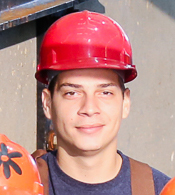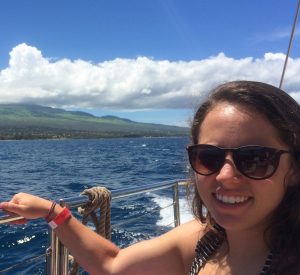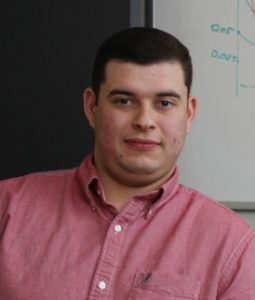Undergraduate and graduate students in Coastal Resilience Center of Excellence (CRC) education programs were involved in a wide variety of academic exchange and professional internship programs this past summer, providing them the opportunity to gain important research skills and experience designed to aid their academic and future careers.
Seven students from CRC Education & Workforce Development (E&WD) partner institutions participated in the SUMmer Research Experience (SUMREX) Program, the centerpiece of the Center’s efforts to integrate its research and education projects. With facilitation and management of the SUMREX program provided by CRC Education Director Dr. Robert Whalin, CRC Education & Workforce Development partners arrange for one or more students to visit the home institution of participating CRC Research PIs for a summer research internship lasting between six and 10 weeks. Key to the program’s success is making the best match between the student interns and the research PIs, so that the students have the opportunity to become fully immersed in a research project.
The CRC has recently launched a companion program called RETALK, through which the E&WD PIs sponsor a seminar or lecture given by a Research PI on the campus of the host university. Visiting CRC PIs will discuss their current CRC-sponsored projects while engaging the students in discussion about the science and its ultimate impact on coastal resilience.
To read full statements from students involved in CRC projects, visit http://coastalresiliencecenter.unc.edu/students.

Kevin Cueto-Alvarado, a first-year graduate student in the Civil Engineering master’s program at the University of Puerto Rico at Mayagüez (UPR-M), was one of two students who worked at Oregon State University Hydraulic Wave Laboratory on a project designed to improve the structural resilience of coastal buildings.
“With my participation in this research, I had the opportunity to acquire knowledge on waves and structures interactions, in which I am particularly interested for my major thesis,” Cueto-Alvarado said. “As a professional, it is very important to have the ability to interact and work with others, to improve the job efficiency. Through the seven weeks’ experience I had the chance to expose myself and develop this essential ability.”
Felix Santiago-Collazo, also a UPR-M graduate student, split the summer working with Dr. Scott Hagen of Louisiana State University and Dr. Stephen Medeiros of the University of Central Florida on their joint CRC project. His work included learning the Linux computing system and working on ADCIRC storm surge modeling for the Gulf of Mexico.
“This experience helped me open doors for PhD opportunities at U.S. universities,” Santiago-Collazo said. “It helped me realize the importance of taking into consideration coastal hazard modeling in hydrologic modeling. This opportunity reaffirms my desire to complete a PhD and become part of the academic and research faculty.”
CRC Career Development Grant recipients, both graduate students at the University of North Carolina at Chapel Hill last spring, had opportunities to engage with federal partners on interesting projects. Graduate student Ashton Rohmer interned with the National Park Service, where she worked on climate change adaptation planning.
“Through my internship, I advanced my graphic design skills… and further refined my public speaking skills by presenting my work to various audiences,” Rohmer said. “By enhancing these communication skills, I will be able to collaborate more effectively with stakeholders in my next role building more resilient communities.”

Recent UNC-CH master’s degree recipient Lea Sabbag interned with the University of Hawaii Sea Grant Program and worked on pre-disaster recovery planning.
“Through my summer experience, I acquired deeper insight into coastal management challenges and various land use applications as they relate to special management area permits, Hawaii’s shoreline rules, and cases where variances may apply,” Sabbag said. “This knowledge, coupled with my academic experience at UNC-Chapel Hill, expanded my understanding of risk and uncertainty in complex systems, and will be invaluable to my future career as a natural hazards planner.”

The CRC also hosted a guest faculty member and student from Benedict College, in Columbia, S.C., at UNC-Chapel Hill. Reinaldo Santiago, a rising senior at Benedict, worked with Dr. Anton Bezuglov and CRC PI Dr. Brian Blanton on testing artificial neural networks for applicability in storm surge modeling.
“This research gave me an excellent opportunity to work with Artificial Neural Networks, learn how they are implemented and trained, learn new algorithms, and technologies,” Santiago said. “It gave me an opportunity for better understanding of natural disasters, in this case hurricanes, and a chance to see what the future will be. The experience gained by doing this research has impact on my academic and career planning. I could experience the real-life office work on a real-scale research project.”
